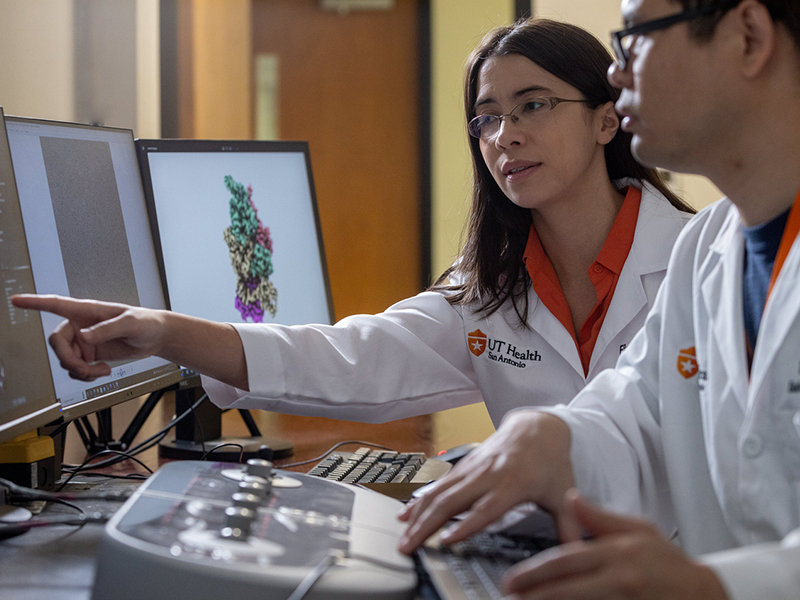Sponsored by:
In today’s global race for top students, researchers and funding, UT Health San Antonio rises as a recognized leader in biomedical research and clinical excellence. Competing internationally, the university draws the brightest minds and advances groundbreaking health care innovations that impact San Antonio, South Texas and beyond.
In Nature Index 2024, UT Health San Antonio ranked No. 32 out of 917 nationally for research output as a health care institute. The 2024-2025 U.S. News & World Report’s Best Global Universities rankings listed UT Health San Antonio as No. 51 among the world’s top 1,000 universities with clinical medicine research programs. UT Health San Antonio is in the top 5% worldwide, demonstrating its impact and reputation on a global academic stage.
“Being ranked among the best in the world is a testament to the caliber of our research and the dedication of our faculty, students and staff. A global reputation allows us to attract diverse talent, foster international collaborations and address the most pressing health challenges across borders,” said Jennifer Sharpe Potter, Ph.D., MPH, UT Health San Antonio senior vice president for research, founding director of the university’s Be Well Institute on Substance Use and Related Disorders and professor of psychiatry and behavioral sciences.
As South Texas’ largest academic research institution, UT Health San Antonio leads with a $413 million research portfolio. The university’s 1,500 researchers, working across 108 specialized research units, produce more than 2,300 scientific publications annually, advancing knowledge in critical fields such as Alzheimer’s and other neurodegenerative diseases, cancer, chronic pain, metabolic diseases including diabetes, mental health and military health. UT Health San Antonio is a leader in research and clinical breakthroughs, with more than 550 clinical trials currently underway.
This year’s high rankings by U.S. News & World Report also include a listing as No. 12 in normalized citation, highlighting the influence of research produced by UT Health San Antonio scientists and the university’s global research impact. Additionally, the university was ranked No. 6 by Nature Index for institutions in North America experiencing the fastest growth in research output. Nature Index tracks contributions to research articles published in high-quality natural science and health science journals.
Among innovative projects conducted this year with international reach were the following:
Pei Wang, Ph.D., and her research team in the Department of Cell Systems and Anatomy were able to induce normal cells to turn tumorigenic, showing for the first time the genesis of a pancreatic tumor in the earliest stages. Their work provides one of the first models to study the progression of normal human pancreatic cells toward tumor cells. Illumination on this process could aid the development of early biomarkers and potential treatment targets for this deadly disease.
A pilot study conducted by A. Campbell Sullivan, Psy.D., with the Glenn Biggs Institute for Alzheimer’s and Neurodegenerative Diseases, and other UT Health San Antonio researchers showed that the antiretroviral drug lamivudine, commonly used to prevent HIV, shows promise as a treatment for Alzheimer’s disease. The antiretroviral drug, already approved by the Food and Drug Administration, showed significant improvement in neurodegeneration and inflammation.
The School of Dentistry’s Nathaniel Jeske, Ph.D., led a pivotal study investigating how obstructive sleep apnea contributes to chronic pain. It is the first of its kind to explain the mechanism behind persistent pain related to obstructive sleep apnea.
“The groundbreaking discoveries that our investigators are making have a global impact not only on advancing scientific knowledge, but also in delivering novel solutions to human diseases that at present have no cures,” said Manzoor Bhat, M.S., Ph.D., vice dean for research and distinguished chair in neurosciences at the university’s Joe R. and Teresa Lozano Long School of Medicine.
In August, UT System Board of Regents announced The University of Texas Health Science Center at San Antonio and The University of Texas at San Antonio will merge in 2025, pending approval by the Southern Association of Colleges and Schools Commission on Colleges (SACSCOC). The merged university will be the third largest in Texas. By merging each institution’s complementary and unique strengths, Texans will have access to the best education and health care imaginable, while accelerating the university’s profound influence and impact, accelerating the translation of research to clinical practice.
The University of Texas Health Science Center at San Antonio (UT Health San Antonio) is one of the country’s leading health science universities and is designated as a Hispanic-Serving Institution by the U.S. Department of Education. With missions of teaching, research, patient care and community engagement, its schools of medicine, nursing, dentistry, health professions, graduate biomedical sciences and public health have graduated more than 43,886 alumni who are leading change, advancing their fields and renewing hope for patients and their families throughout South Texas and the world. To learn about the many ways “We make lives better,” visit UTHealthSA.org.
Stay connected with The University of Texas Health Science Center at San Antonio on Facebook, Twitter, LinkedIn, Instagram and YouTube.
Stay current with the latest research from UT Health San Antonio at the university’s Newsroom.


